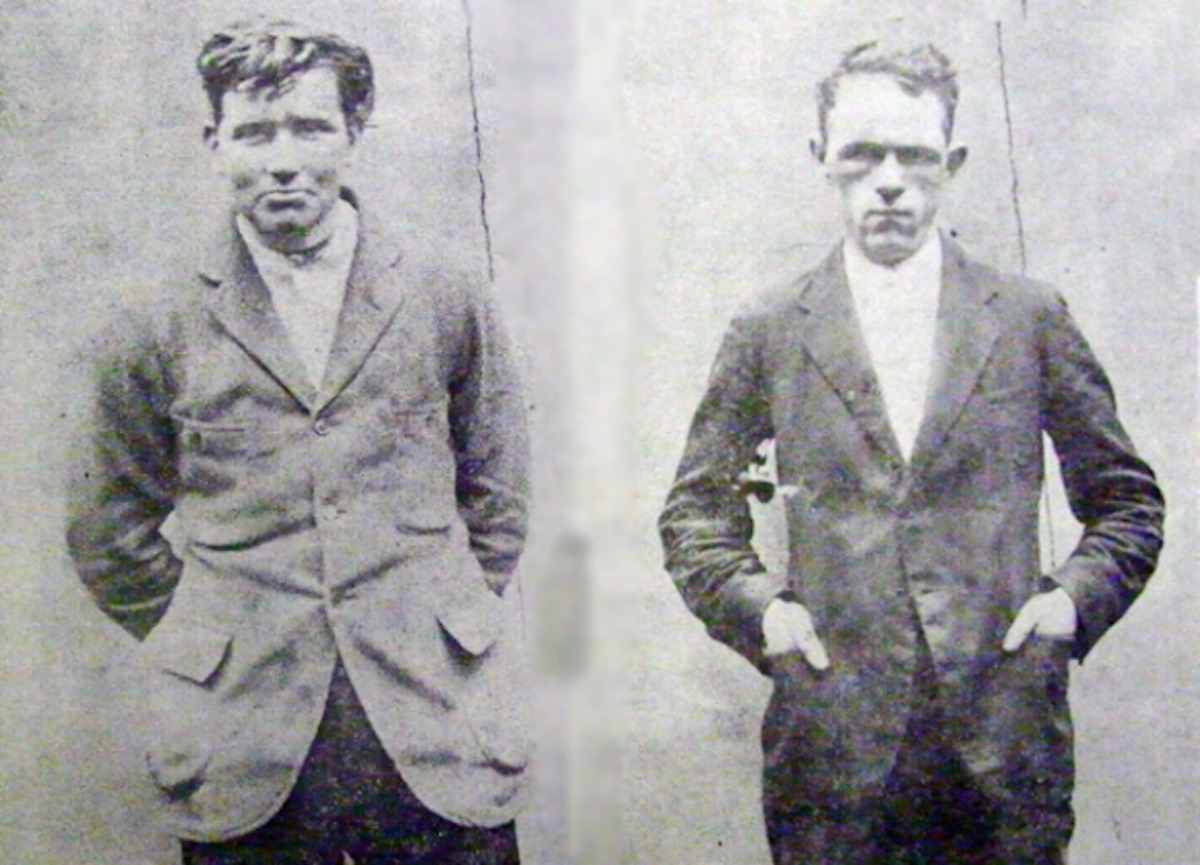
Joseph O’Sullivan and Reginald Dunne were members of the Irish Republican Army who shot dead British Army Field Marshal Henry Hughes Wilson at Eaton Place in London on 22 June 1922. Both were former British army soldiers who joined the London IRA. They were hanged by the British on 10 August 1922 at Wandsworth Prison, 100 years ago this week.
REGINALD DUNNE
Reginald Dunne (pictured, left) attended St Ignatius’ College in Tottenham, North London. He was a former British Army private in the Irish Guards who fought in the First World War.
On trial, Reginald Dunne addressed the jury about how in the recent Great War he had been “fighting for the principles for which this country (Britain) stood. Those principles I found as an Irishman were not applied to my own country…”
Dunne wrote a speech which he was prevented from making from the dock. In it he blamed Wilson for raising the “Orange Terror” with the deployment of the Ulster Special Constables shortly before the partition of Ireland.
“... We took our part in supporting the aspirations of our fellow-countrymen in the same way as we took our part in supporting the nations of the world who fought for the rights of small nationalities... The same principles for which we shed our blood on the battle-field of Europe led us to commit the act we are charged with.
“You can condemn us to death today, but you cannot deprive us of the belief that what we have done was necessary to preserve the lives and the happiness of our countrymen in Ireland. You may, by your verdict, find us guilty, but we will go to the scaffold justified by the verdict of our own consciences.”
JOSEPH O’SULLIVAN
Joseph O’Sullivan’s parents were both originally from Ireland. As a boy, O’Sullivan attended St Edmund’s College in Hertfordshire, England. On 25 January 1915 (his eighteenth birthday) O’Sullivan enlisted into the British Army, and served as a lance corporal with the London Regiment during the First World War and lost a leg at Ypres in 1917.
On being discharged from the army in 1918, O’Sullivan was employed by the Ministry of Labour, located adjacent to the Scotland Yard police HQ. It is probable that O’Sullivan used his position in the civil service to obtain information for the London IRA.
Joseph O’Sullivan is thought to be responsible for the shooting of the informer Vincent Fovargue. Fovargue was 21 years old when he died and had been an officer in the Dublin IRA. He had been captured and tortured by the Crown Forces and allowed to “escape” after promising he would infiltrate the London IRA. He was found dead on a golf course in Middlesex on the 5th April 1921 with a label pinned to his body stating “Let spies and traitors beware”.
In his final letter to his father, Sullivan quoted the republican ballad The Felons of Our Land: “Although I die in the eyes of this country a felon, remember the ‘felon’s cap is the noblest Crown an Irish head can wear’ and how many of our noble countrymen have gone the same way as Reg and I.
“Tell Mrs Dunne when you see her how proud I am to be dying alongside of her son, for old Ireland never had a truer or braver son than he and give my love to all my friends.
“So be of good cheer and with God’s help we will be united again, never more to part, but, in the meantime, keep praying that God will grant our dear country that unity and liberty which we all desire of her.”
Both men were found guilty within minutes and were hanged on 10 August 1922 before being buried within the prison grounds.
Hundreds gathered outside Wandsworth Prison for the execution. Dunne and O’Sullivan met their deaths “with the same unflinching demeanour they manifested at the trial”, according to an eyewitness reporter from the Press Association.
It was only after the abolition of hanging that the law was changed and Joseph’s brother, with the assistance of the Irish National Graves Association, was able to arrange for the bodies of the two men to be repatriated to Ireland.
In 1967, the British government allowed the bodies of Dunne and O’Sullivan to be exhumed and they were subsequently reburied in Deans Grange Cemetery outside Dublin.
Former comrades accompanied the bodies from England to Dublin airport, where they placed an Irish tricolour flag on Dunne’s coffin. This was the same flag that Dunne had placed on the coffin of Terence MacSwiney at Euston Station when his body was returned to Cork in 1920.
![[Irish Republican News]](https://republican-news.org/graphics/title_gifs/rn.gif)
![[Irish Republican News]](https://republican-news.org/graphics/title_gifs/harp.gif)

